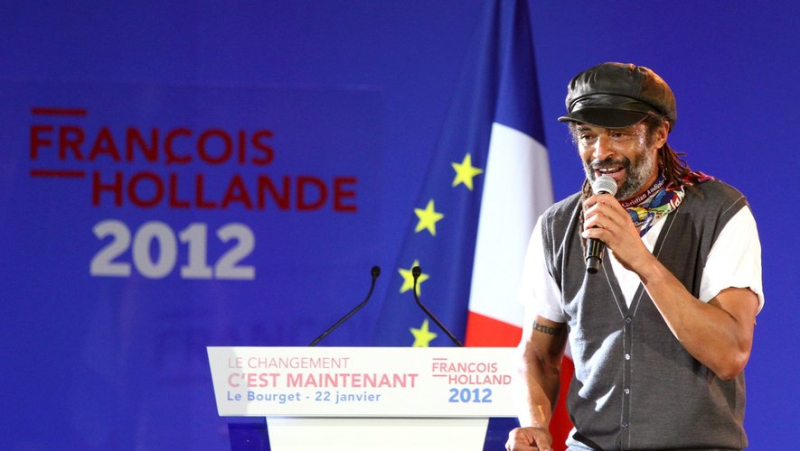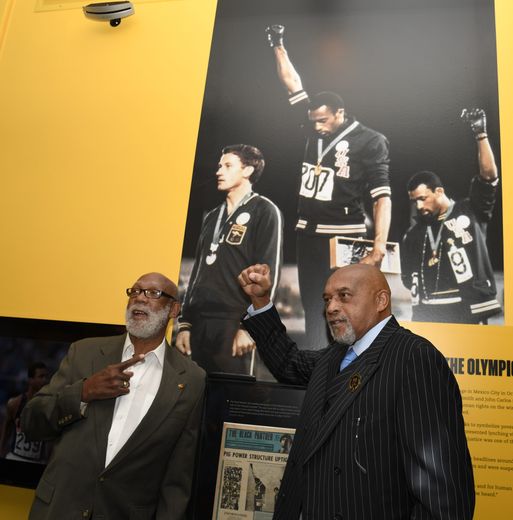Paris 2024 Olympic Games: when athletes get involved in politics and the fight against discrimination

Yannick Noah, here supporting François Hollande in 2012, has always actively fought the far right. MAXPPP – DELPHINE GOLDSZTEJN
Tribune in the Team, speeches by executives of the Blues at the Euro football: the speech of athletes, long restricted in the political field, seems to be freed more and more. To fill a lack of credibility of other actors?
Athletes who leave the field of sport to invest in that of political commitment or in favor of a cause that seems just to them. History is full of these moments when the head surpassed the legs. From Tommie Smith to Lebron James via Mohamed Ali, many athletes have freed themselves from the duty of reserve and sometimes from these rings supposed to bind them in the silence of performance.

John Carlos and Tommie Smith in front of the image that forged their legend in Mexico. MAXPPP – MIKE THEILER
When the Olympics turn into “fists”
Two black fists suspended for eternity in the sky of Mexico. On October 19, 1968, the Olympic Games of the modern era certainly moved into another dimension. Gold and bronze medals in the 200m, Americans Tommie Smith and John Carlos lower their heads and raise their gloved hands during the American anthem.
A clear reference to the Black Power movement and Malcolm X and a way of denouncing the unfair treatment of black people in the United States. The only white figure on the podium, the Australian Peter Norman seems foreign to the affair.
However, he played a role behind the scenes by encouraging Smith to lend one of his gloves to Carlos, who had forgotten his own, and by wearing the Olympic Project for Human Rights badge on his chest. The two Americans will be suspended for life and the Australian criticized in his country. In 2006 in a fraternity of outcasts, the two black sprinters will carry Norman's coffin to his funeral.
For the Games, nothing will be the same. In 1976, 22 African nations decided to boycott Montreal a week beforehand to protest against the Apartheid regime in South Africa and a massacre in Soweto.
In 1980, in Moscow, in the midst of a Western boycott, the Pole Kozakiewicz, winner in the pole vault, rewarded the Russian regime with an arm of honor.
In 2000 in Sydney, after her triumph in the 400 m, Cathy Freeman, the first Aboriginal Olympic champion, displayed the red, gold and black standard of her people with the Australian flag. He had to negotiate fiercely with the IOC for this…
Closer to us, French athletes are taking turns in the legislative campaign to encourage voters not to vote for the extremes. Markus Thuram and Kylian Mbappé launched this message at a press conference before the Blues' first match at the Euro.
The call of 60 sports personalities
On Sunday June 16, around sixty personalities from the world of sport, active or not, signed a column in the daily newspaper l’Équipe to call for a barrier to the extreme right. Among them, former athletes Marie-José Pérec and Monique Ewanjé-Epée, sailors Isabelle Autissier and François Gabart, ex-rugby player Fulgence Ouedraogo and Yannick Noah, last French winner of the Roland-Garros tournament. They estimate in their forum that the extreme right "tramples respect", which they consider to be "one of the cornerstones of sport".
Since 2002, and the accession of Jean-Marie Le Pen to the 2nd round of the Presidential election, this type of forum has been recurring. In 2017, around sixty athletes called to vote for Emmanuel Macron to repel the threat of Marine Le Pen. Among them, the Catalan biathlete Martin Fourcade. Unlike Zidane or Matuidi, signatories, the Blues of the new generation were conspicuous by their absence.
Empowerment with social networks
Consultant trainer on development through ethics in sport, creator of the Licra sports commission and former member of the Sport and Citizenship Scientific Committee, Carine Bloch observed an acceleration in the release of the words of athletes with the advent of social networks: "Before there were always agents or managers to prevent players from expressing themselves. With social networks, it becomes more difficult to have a grip on them."
Institutions were forced to adapt. Even the neutrality advocated by the International Olympic Committee has become an illusion with the amendment, at the request of the athletes' commission, of the article which prohibited them from expressing themselves on political subjects. They can now express their opinions on the ground, only if they do not target, directly or indirectly, any population or any country in its dignity.
Emile Leclerc: “A marginal impact”
Director of studies at Odoxa, Emile Leclerc discusses a study carried out in 2020 on the impact of athlete engagement.
What is the impact of athletes' words ?
In 2020, we carried out a survey on the commitment of athletes to societal issues in the broad sense, politics but also discrimination, charity… hellip; 54% of those surveyed believed that the athlete was in his role. There was a very deep divide between supporters on the left who were 73% who thought that and those on the right who were only 37% who thought so. Director studies by Odoxa, Emile Leclerc discusses a study carried out in 2020 on the impact of the commitment of athletes.
For some, athletes are overcommitted ?
To this question, 39% thought that athletes were not committed enough, 22% not enough and 39% thought that it was right.
Are these instructions or calls followed by effects ?
There we had a minority of French people, 42%, who felt that this speech was important to them. It’s a minority but it remains a significant number with still the strong left-right divide. This result must be qualified. It is not because their opinion is important that voters will necessarily follow it. This is one opinion among others. You also have the artists, the influencers who express themselves. If it has an impact, it is probably at the margins.
It remains to be seen whether these champions and these shock attackers will have as much impact on this field. "L& ;rsquo;argument of counter-productivity we only hear it from opponents, not from young people, notes Carine Bloch.Athletes tend to supplant at this level artists who were already historically involved. Young people identify with these people they idolize. You can earn a lot of money and not be disconnected or out of touch as some people claim. Mbappé goes to Bondy again, he knows their realities."
Compensating for the lack of credibility of policies
For this specialist in ethics in sport, the commitment of these athletes compensates for a lack of credibility of other actors: "They would probably prefer to concentrate on their competitions. If they do, it’s not by chance. With the spectacle given by politicians and the words of scientists which are unfortunately not taken into account at their true value, young people are more able to identify with these athletes. And they manage to follow them because they keep a groove, they don't say one thing and its opposite the next day."
I subscribe to read more




